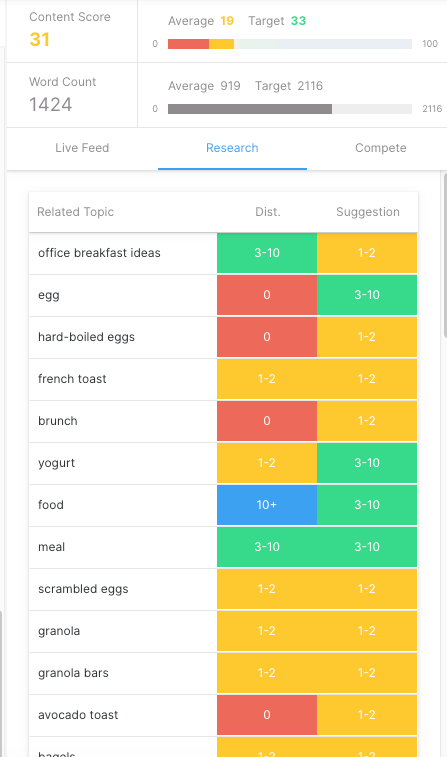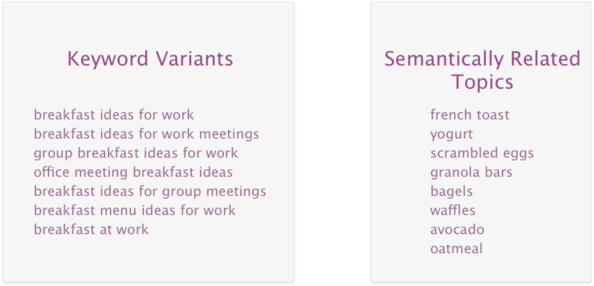Keyword Research as We Know It Is Dead
You no longer rank one keyword to one page, so why are you planning that way?
Years ago, it was common practice to create pages targeting individual keywords. Often sites would end up with similar content because the targeted keyword were themselves similar. So, you could end up with separate pages like:
- best content strategy guide
- ultimate content strategy handbook
- greatest content strategy manual
You get the picture.
We laugh at it now, but back then everybody was doing it. Why? Because it worked.
Over the years, Google has become better at understanding content and user intent. As a result, we no longer see that one-to-one situation.
A well-written authoritative page doesn’t rank for just one search term, it ranks for many. Using search volume for individual words in isolation is dead. It’s been dead for a long time.
To better understand why keyword research no longer works the same way, we need to break things down – starting with keyword search volume.
The Problem With Keyword Search Volume
The majority of content marketers engaged in keyword research rely heavily on search volume as a metric. Unfortunately, it’s not very accurate because search volume presented in keyword research tools is based on “trackable” traffic.
There are a significant number of search queries that are unique and don’t see any monthly search traffic; they’re not trackable.
Keyword tools have a search volume cut-off point for the keywords they track. That’s how much monthly volume a search term needs to have in order to be included. For some, it may be 10 searches a month but for others it could be 50 monthly searches.
What does this all mean?
A highly authoritative piece of content on a highly authoritative site can receive organic traffic far in excess of the monthly searches indicated by the keyword tool.
Term Pool Multiplier and Untrackable Traffic
The phenomenon where a page gets far more traffic than the monthly search term of the keyword it’s targeting is what we call the term pool multiplier. It happens because Google RankBrain assigns long tail queries to authoritative content with good intent profiles.
If you’re getting way more traffic than suggested by Ahrefs or SEMRush, that’s the term pool multiplier effect. That traffic comes from all the other keyword for which that page ranks, including zero volume search terms.
There’s nothing better than an example, so let’s take a look at this article, Thank You Office Breakfast Ideas For Your Employees, that’s on the WeWork blog.

This post targets the keyword phrase “office breakfast idea.” That’s most likely the goal since the title contains that term and it’s also used as a sub-header immediately at the beginning of the post.
So, how much organic traffic could a post get from this keyword?

If everyone clicked on the first position for this search term, which they occupy, then they could expect 720 monthly visits. But that’s highly unlikely, so the number would be substantially less.
As it turns out, the amount of traffic to this post is far higher than suggested by the keyword volume. According to SEMrush, that page received around 2,100 visits in April 2019; nearly three times the search volume for the target phrase.

How is that possible?
This article ranks for a vast number of search terms in addition to the one being targeted. SEMrush estimates this URL ranks for 1,600 keywords, but that’s only the search terms it knows about. All those unique queries that get “zero” traffic aren’t tracked, even though they can have a substantial impact.

How to Take Advantage of the Term Pool Multiplier Effect
Wonderful! But how do you write an article like this, that ranks for thousands of keywords?
Let’s start off by explaining what you don’t do. Don’t try to cram all those keywords into the post! They didn’t, and you shouldn’t either. That article ranks for more search terms than there are words in the post, so it just wouldn’t work.

The key is to create expert-level content based on a sound topic model, one that analyzes hundreds of thousands of pages instead of just the top 10 or 20. Looking at an analysis of the WeWork post, using MarketMuse Suite, a few things become apparent.

The high content score of 31, compared to the average score of 19, indicates it’s a pretty comprehensive article. Also, the author has done a good job of covering most of the important concepts surrounding the topic “office breakfast ideas.”
The Difference Between Keywords and Topics
A keyword-oriented approach would be to use as many variations of the main keyword as possible. That’s a typical search engine optimization approach. But that’s not what’s happening here.
The article ranks for a number of terms that are never mentioned in the post:
- breakfast ideas for work
- breakfast ideas for work meetings
- group breakfast ideas for work
- office meeting breakfast ideas
- breakfast ideas for group meetings
- breakfast menu ideas for work
- breakfast at work
What we observe with this page is the proper coverage of topics semantically related to the focus topic, such as:
- French toast
- Yogurt
- Scrambled eggs
- Granola bars
- Bagels
- Waffles
- Avocado
- Oatmeal
Here’s the difference. Keyword variants are just different ways of expressing the same idea. Semantically related topics are the concepts that make up the that idea. Those are the abstractions that need to be addressed within the post.

So, a blog post about “office breakfast ideas” needs to talk about French toast, yogurt, scrambled eggs and all those other delicious foods. Using keyword variants is not the path to expert-level content.
How to Beat The Competition in Organic Search
Don’t be afraid to target search terms that appear to have little traffic. To beat your competitors, you need to start thinking differently and more strategically.
Earlier on I mentioned that search engines assign long tail queries to authoritative content with good intent profiles. That doesn’t mean you start targeting long-tail keywords. Neither should you be concerned about keyword difficulty, domain authority, or any other metrics typically associated with keyword research.
Take your keyword list and throw it in the trash. Your keyword research process is not the problem.
Instead, start thinking about topics.
As we’ve shown, expert-level content can attract far more traffic than any keyword planner tool would indicate.
Use a robust topic model to ensure the content you create is truly expert-level. MarketMuse can help you there. Create additional content satisfying other user intent profiles and link those relevant articles together. A proper internal linking architecture is incredibly powerful. Again, MarketMuse can help.
Make sure the blog posts you publish have the best chance of success. Conduct an analysis of your site to discover what semantically-related topics have been covered, what hasn’t, and which ones are most likely to succeed. One last time, MarketMuse can help.
What you should do now
When you’re ready… here are 3 ways we can help you publish better content, faster:
- Book time with MarketMuse Schedule a live demo with one of our strategists to see how MarketMuse can help your team reach their content goals.
- If you’d like to learn how to create better content faster, visit our blog. It’s full of resources to help scale content.
- If you know another marketer who’d enjoy reading this page, share it with them via email, LinkedIn, Twitter, or Facebook.
Stephen leads the content strategy blog for MarketMuse, an AI-powered Content Intelligence and Strategy Platform. You can connect with him on social or his personal blog.